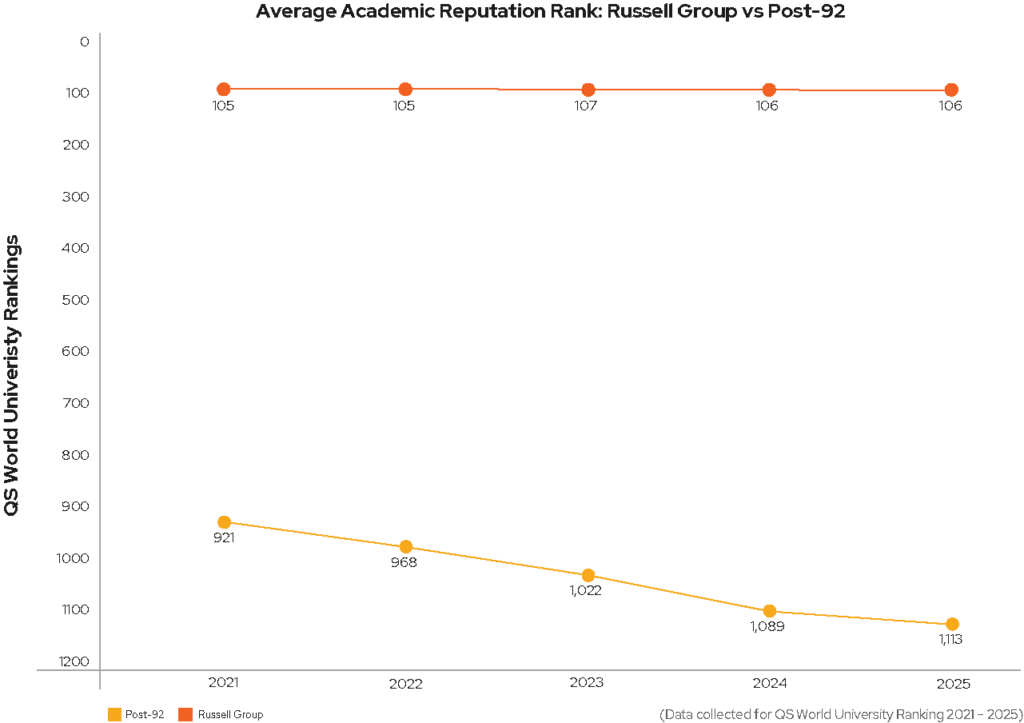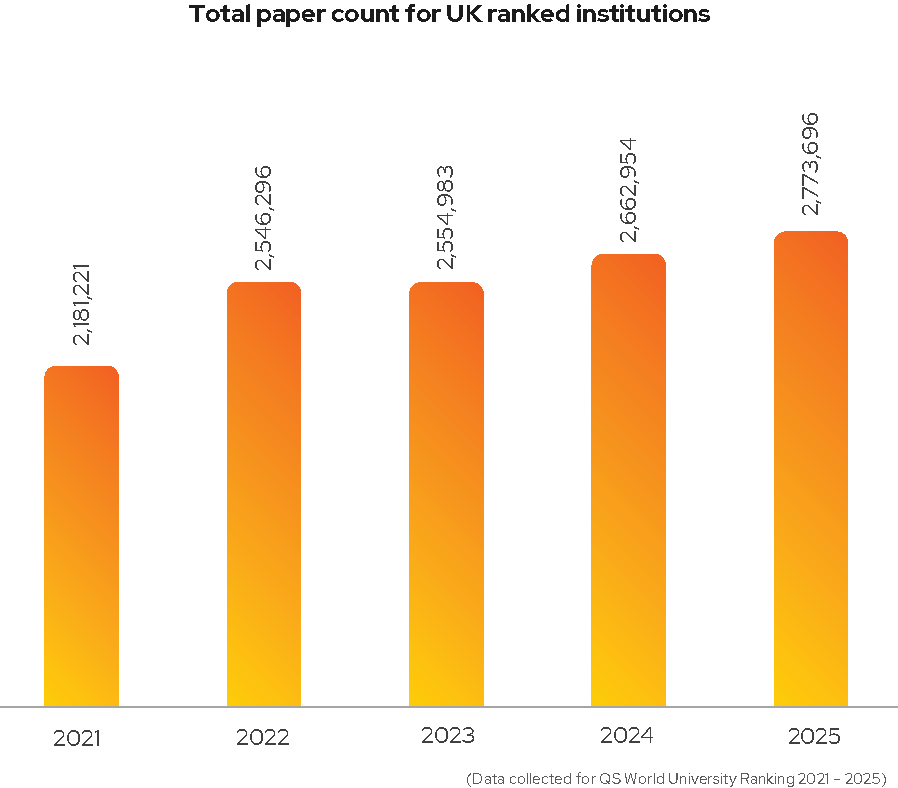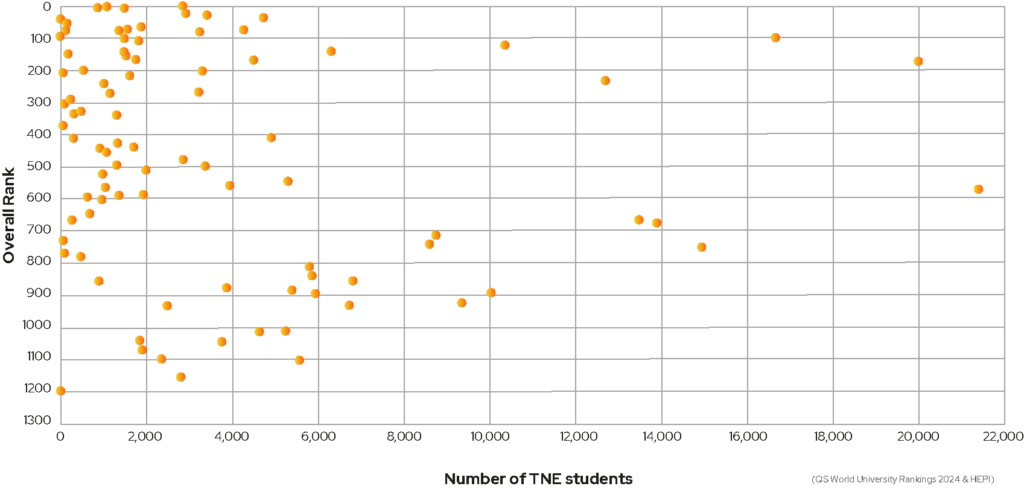
Recently, Office for Students interim Chair, Sir David Behan, said that the “golden age of higher education” in the UK is over as significant funding crisis faces the sector. Just days prior, UK higher education minister Baroness Jacqui Smith was asked if she is willing to see a university go bust, with institutions already facing that risk. Her response: “Yes. If it were necessary.”
A confluence of issues – UK Government policies aimed at limiting international student numbers have affected university income, declining domestic enrolment, rising operational costs and Brexit-related funding cuts – have forced UK institutions to pare back their offering. 40% of UK universities are facing financial deficit this year, according to the Office for Students.
QS student enrolment data points towards international enrolments diminishing for some UK universities. As we explore in more detail, steadily declining institutional performance in key QS metrics does nothing to improve that picture – 44% of prospective students interested in the UK state that a well-ranked university is most important when choosing where to study (QS International Student Survey 2024).
The UK needs solutions to these fiscal challenges to maintain its position as a world-leading study destination, but is the “golden age of higher education” over, or is there more to consider, and what can UK universities really do to turn the tide?
Enrolments are an immediate concern, but reputational issues will cause longer-term issues
As Matteo Quacquarelli, QS Vice President of Strategy and Analytics, explored in HEPI in May 2024, offers for postgraduate study are down year on year, but Russell Group universities are performing better while the markets that have fuelled growth for post-92 and modern universities have slumped. This is an immediate concern to those losing out.
The importance of international tuition fees to university sustainability cannot be overstated, especially with the value of home student fees declining in real terms. HESA data, analysed in The Guardian, shows that tuition fees from overseas students have increased by 71% in 6 years, from £5.4bn in the 2016-17 academic year to £9.7bn in 2021-22. As a result, more than a fifth of UK universities’ total income came from payments from international students (21.5%) last year, up from 15.6% in 2016-17. Any reduction in this revenue will cause significant challenges.
While UK universities are reporting increased incomes (HESA), it’s not enough to outpace rapidly growing expenditure.
Unfortunately, the story doesn’t end there. Analysis of QS institutional performance data shows a reputational decline, which may cause longer term issues. We explored the correlation between reputation and international student recruitment earlier this year – read the details.
In data collected for the QS World University Rankings, UK universities’ average academic and employer reputation score has declined since 2021.

However, when we look at two key segments, Russell Group and post-92 universities, we can see which universities are driving this decline.

Russell Group universities maintain a strong average academic reputation rank, while post-92s are declining. The story is the same for employer reputation – the Russell Group’s average employer reputation rank stays around 120 in the world, while post-92 universities drop from 742 in 2021 to 949 in 2025. While this could be due to new entrants in the rankings entering in lower positions before they work on enhancing their reputation across QS metrics, the fact remains that UK institutions’ academic and employer reputation is on a downward trend.
Declining reputation among key stakeholders is indicative of the end of ‘the golden age’. If the UK is not perceived as exceptional by employers and academics, that will have an adverse effect on the ability of universities to recruit internationally, foster new partnerships and survive long-term. However, while the numbers are downcast there is still time for UK higher education to turn this around.
The new Labour government is delivering a more welcoming rhetoric to encourage international students to study in the UK. The post-study work visa – an important factor when trying to attract international students – will remain in place, at least for now.
With a more positive environment, universities must take this opportunity to sustain short- and long-term success for recruitment and reputation. With the future still unwritten, there is still time for UK universities to stem the decline and maintain the UK’s golden age.
Research is a point of strength but faces competition
While not comparable to the sheer quantity of research papers coming out of the US and China, UK universities’ research output continues to punch above its weight. Data from the QS World University Rankings 2025, via SCOPUS, shows that UK ranked universities produced 2,773,696 research papers last year. While below the six and eight million papers produced by China and the US respectively, the UK is far ahead of Germany, which produced 1,913,981. This is despite large disparities in population size and number of universities.
The number of papers the UK is producing is also increasing year on year.

However, while UK research production is high, there has been minimal growth in the last five years. In contrast, China’s research productivity is high and it is accelerating – Chinese research output has grown by 95% in the last five years compared to only 27% for the UK.
Without impact, research output gives little weight to overall academic reputation and as we witness the expansion of China’s higher education sector challenging the status quo of Western research superpowers, it does pose a risk to established UK universities and their academic reputation. It is vital that UK institutions have the resources to invest in ambitious research programmes that will enable them to preserve their global standing.
The power of student experience
London is the world’s number one best city for students. Ben Sowter, QS Senior Vice President, explored the impact a university’s location plays in reputation development for HEPI, stating that universities based in London have a positive halo effect. “[London’s] reputation has also helped [the city’s] lower-ranked universities find and recruit international faculty and students.”
The city’s performance in QS Best Student Cities 2025 is, in part, due to students’ perception and experience in the city. Highlighting the great student experience available at your institution should be part of your marketing matrix. In the QS International Student Survey 2025, we asked what five things are most important when choosing a town or city – consider how you can reflect their preferences.
What five things are most important to you when choosing a town or city to study in?
| It is a safe and welcoming place for international students | 76% |
| It has universities with high quality teaching | 61% |
| It has good lifestyle and leisure opportunities | 58% |
| It has a good reputation as a place to study | 55% |
| Cost of living | 50% |
| It has well-ranked universities | 50% |
| The university’s location is renowned for the field of work I’m interested in | 41% |
| It has affordable rental accommodation | 41% |
| I can work while studying | 40% |
| I have friends or family living there | 13% |
| It was recommended to me | 11% |
| I already live there | 3% |
The TNE opportunity
The strength of the UK brand makes transnational education (TNE) a more viable opportunity for UK institutions, regardless of their ranking position. Indeed, 38% of TNE students at UK universities study within institutions that aren’t included in the rankings.
While a decline in reputation metrics may cause a reduction in international student enrolment numbers, TNE could plug this gap by offering alternative pathways for students who might be unable or unwilling to relocate to the UK for their studies.

Building student and alumni advocacy
Career considerations are a vital component of the student decision-making process, with 50% of students prioritising career considerations when choosing a course (QS International Student Survey 2024).
Developing a clear employability strategy that focuses on the outcomes of their students is key for universities – happy, employed graduates become strong advocates who can illustrate the impact of their course and university on their careers. A quarter of prospective students feel that discussions with alumni are the most helpful source of information when researching a university (QS International Student Survey 2024).
Dynamic pricing
With competition for international students rising, universities have to work harder for each student enrolled. While the domestic tuition fee debate in the UK is heated, dynamic pricing for international students is one option that the sector should not rebuff. Whether demand-based, merit-based, country specific or altered for the time of application, dynamic pricing provides flexibility not often taken advantage of.
However, equity concerns and market sensitivity are very real and significant challenges, while cost is a real concern for prospective students. In the QS International Student Survey 2024, 45% of students said that affordable tuition fees are the most important when choosing a course, and 69% said that the cost of living is their biggest worry when considering studying in the UK.
QS can help your institution understand the perception of your university, and help you leverage your strengths to maximise student recruitment effectiveness.



